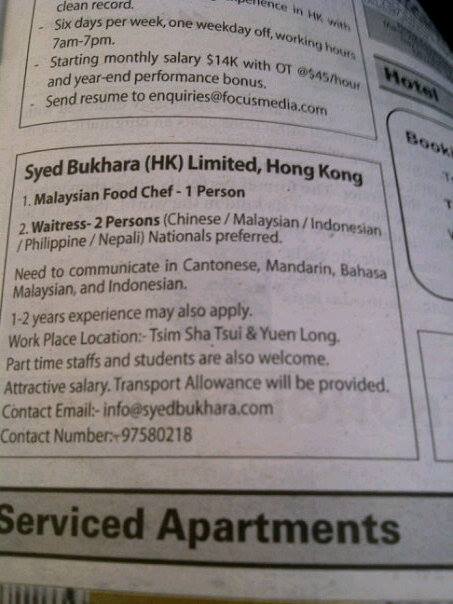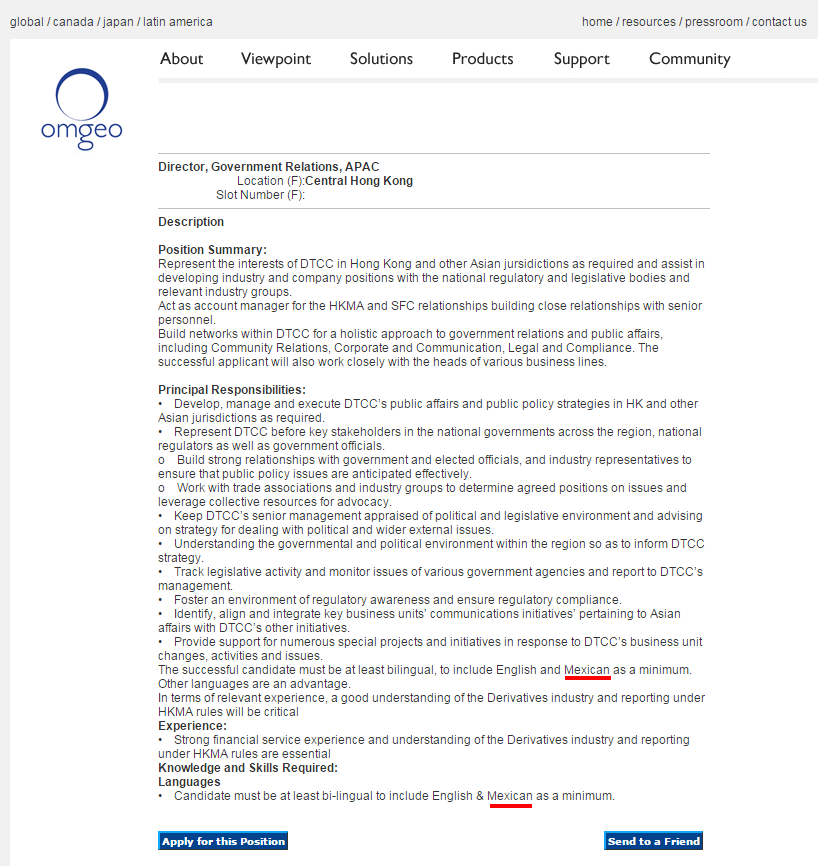Mandarin or Mexican, whichever
« previous post | next post »
I just returned from Hong Kong last night. One of the strongest impressions I bring back from this visit is that the city is becoming even more multilingual than it was in the past. Hong Kong is a global center of finance and business. The number of different languages one hears being spoken on the streets, in restaurants, on buses and trains is simply astonishing. The government has an official policy of three languages (Cantonese, English, and Mandarin) and two scripts (Chinese characters and the Roman alphabet), as discussed in these and other Language Log posts:
- "Cantonese and Mandarin are two different languages " (9/25/15)
- "Hong Kong Multilingualism and Polyscriptalism " (7/26/10)
- "Is Cantonese a language, or a personification of the devil? " (2/9/14)
But the situation has become far more fluid and complex than that.
Jenny Chu writes:
Has Language Log ever had a post about language requirements in job ads / recruitment ads? I remember when I arrived in Hong Kong in 1996, most ads specified that the candidates must have a good command of "written and spoken English and Chinese". From my casual observation, this seems to have changed over the years to a requirement for "English, Cantonese, and Mandarin", now sometimes even stating that "another Asian language" would be a bonus.
Is my observation backed up by any data? I don't have the facts.
But in the meantime, attached are two ads I came across recently that went well beyond a simple requirement for English and Chinese:
- An ad, written in English, that requires the candidate (a waitress) to communicate in "Cantonese, Mandarin, Bahasa Malaysian, and Indonesian" – and if you take the ad above it as a reference, probably at a salary of not much more than HK$14,000* / month!
- An ad for director of government relations, a regional position based in Hong Kong, that requires the candidate to speak "English and Mexican as a minimum"
[VHM: *US$ 1805.97]
When I first saw the waitress ad, I assumed that it was a mistake, and that "and" had been accidentally substituted for "or". But upon a second inspection, I think they really do need waitresses who can communicate in five languages.
For the government relations job, however, I am quite certain that it is supposed to be "Mandarin".
Judging from my observations during this latest trip to Hong Kong and others in recent years, polyglotism is no longer a rarity in Hong Kong: it is a fact of life.


FM said,
December 2, 2015 @ 12:44 am
I know this is Language Log and not Ethnic Profiling Log, but:
"(Chinese / Malaysian / Indonesian / Philippine / Nepali) Nationals preferred."
What??? What is the relevance of nationality (besides the language issue of course, but there's no reason Filipinos would speak Malay/Indonesian) and what did Nepalis do to end up on this list?
Hans said,
December 2, 2015 @ 6:47 am
@FM: I'd guess it may have something to do with waiters looking "Asian / Indonesian" in an Indonesian Restaurant. The same reason why you find mostly Filipino waiters and chefs in Sushi bars in the Middle East – they look (more or less) Japanese, but are much less expensive. But if that's the case, I don't know how the Nepalis got on the list – some of them may look the part, but certainly not all of them.
Victor Mair said,
December 2, 2015 @ 9:39 am
@FM
It has to do with the overwhelming demographics of the available labor pool in Hong Kong. There are very large numbers of individuals from the groups named working in Hong Kong. As a speaker of Nepali, when I first started encountering Nepalis in Hong Kong restaurants and coffee / tea shops about ten years ago, I was pleasantly surprised, but then later I just got used to it as a fact of emigration from Nepal, since I've also been meeting Nepalis in similar situations in Philadelphia, Washington DC, European cities, etc. Finding plenty of Nepalis working in Hong Kong is now no more surprising to me than meeting an abundance of Panjabis and Bangladeshis driving taxis in Philadelphia.
amateurLinguist said,
December 2, 2015 @ 2:43 pm
@Vitor Mair,
You speak Nepali? How many other languages do you speak besides English, Mandarin, and Nepali?
Terry Collmann said,
December 3, 2015 @ 3:30 am
If you go to the UAE you wil find Nepalis driving taxis (and also working on construction sites, as they do also n Qatar). Meanwhile ALL the coffee shop workers are Filipino and all the nannies Indonesian (being Muslim)
Andrew (not the same one) said,
December 3, 2015 @ 12:48 pm
But if the applicant pool is overwhelmingly of these nationalities anyway, why do they have to state that they are preferred?
tangent said,
December 3, 2015 @ 2:12 pm
Maybe the expectation is they're more likely to tolerate the wage level? Still, you'd think people would sort of know the deal, without this preference stated, anyway.
So Lang said,
December 4, 2015 @ 6:57 am
@Hans:
I'm Indonesian, and I was quite surprised at how similar many Nepalis physically are to Indonesians. in fact when I met the first Nepali I knew personally, I assumed he was Indonesian.
Kenny Easwaran said,
December 11, 2015 @ 11:38 am
I'm still struck not just by the expectation of nationality in the waitstaff, but also gender! I'm fairly sure that a lot of those national and gender expectations are illegal to express in the United States (though they still do get expressed in ads).